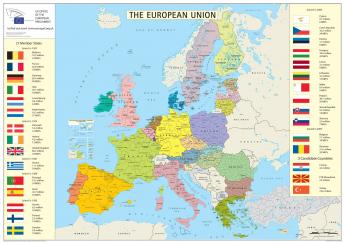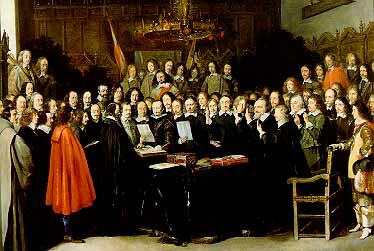Related Topics
Right Angle Club: 2014
New topic 2013-11-19 20:22:11 description
American Exceptionalism Has Something To Do With Compromise

|
| European Union Map |
Let no one suppose I imagine myself an expert in international law. But as a member of a family with newspaper connections, I more readily recognize when someone is conducting a campaign, using a set of plausible arguments in place of the real ones. So, my suspicions are repeatedly reinforced by regular repetitions of the same arguments in different ways, to the effect that America should be more respectful of what is called International Law. Curiously, the same people are of a mindset to oppose European Union, when you would suppose that one argument leads to the other. It is almost a pose that, having won the war as legitimate sovereigns, they are already quashing would-be competitors.
Nationalism had its formal beginnings in the Treaty of Westphalia, about 1648. At that time, there were about a hundred little countries along the banks of the Rhine River, starting in Switzerland which was broken into four cantons, and south of the Swiss stretching the length of Italy, ending up in the far tip of Sicily. Many of these nations were no bigger than a golf course and were often leftovers from the robber barons who extorted bribes from passing boats in return for not attacking them. That is, they were protection rackets, which survived as rackets in the far tip of Sicily until 1880 or so, until Garibaldi emancipated them from their evil ways, and unified Italy.

|
| Treaty of Westphalia |
In 1648 the Pope was in nominal charge of everything, and all the rest of the Rhineland behaved the way we now think of the Mafia as behaving, in secret societies. Martin Luther's Protestant Reformation had broken the Holy Roman Empire into warring camps, shifting alliances as local politics required. It took a long time to get everyone into an agreement, but the outcome was the Treaty of Westphalia, which essentially made everyone agree to respect the national boundaries of the others, and the religion of the inhabitants of each country would adopt the religion of the local king. There had been nations before there was nationalism, but the Westphalian version operated with national boundaries as the defined beginning, rather than tribes, languages or religions. That sort of agreement displeased the Pope, of course, but it had the utility of lessening the endless warfare and pillage, each one of each other. Offhand, you might not have thought of boundaries as superior to ethnic inhabitants as an organizing principle, but somehow it worked better than the alternatives. Nationalism became the ruling premise throughout the world. If you win, your winnings are limited to the established boundaries. The treaty of Westphalia served essentially the constitution for a majority of western civilizations, and it was pretty short and sweet, essentially downgrading religion as an organizing principle and replacing it with defensible boundaries, seemingly a degrading change.

|
| City Tavern |
Eventually, thirteen "sovereign nations" in the Western Hemisphere got together and wrote our new Constitution, which had an additional novelty of being written down and describing how the new United States would be organized. Religion was banished from governance, of course, so the way was open to our own nationalism. Among other features was a bicameral legislature. Pennsylvania in 1787 had just had a lot of trouble with a unicameral legislature, but the main impetus opposing that format was found in the small states. John Dickinson of Dover Delaware drew a startled James Madison of Virginia aside and told him the small states didn't like being bossed by the big ones (Virginia was the largest, at that time), and they particularly disliked the idea that it would be written down as a permanent arrangement. In the view of the big states, power would naturally go to the biggest and richest, and that infuriated the small states even more. To them, it meant the small states were expected to pay permanent deference to the ideas of their bigger neighbors, and for example, no one from a small state could ever expect to be elected President. Dickinson drew Madison aside and asked, "Do you want to have a Union, or don't you?" Dickinson was probably thinking in terms of equal representation for each state, no matter its size, while Madison was thinking of proportional representation like the House of Representatives. Rumor has it that Benjamin Franklin gathered folks into the City Tavern and worked out the present compromise. Which is, a bicameral legislature, one body with two and only two Senators per state, the second body with additional representatives for more population, and the agreement that no law would be passed without the agreement of both houses of Congress. Pretty simple, but it has gradually dawned on most people that the United State has held together (Civil War excepted) for two hundred years by debate and compromise, but meanwhile no other union has survived by any means except military force. Underneath that rule must be an assumption: for every quarrel, somewhere there exists a workable compromise. Even Ben Franklin was a little hesitant about that idea.

|
| The League of Nations, United Nations |
The League of Nations, United Nations, and all of the other national groupings, so far including even the European Union, have unicameral legislatures which follow the traditions of the Treaty of Westphalia. Equal representation for all, and therefore majority rule is expected to leave major groups nursing a grudge. In a bicameral state with different rules for election, the ruling instruction is "Don't you come out of that room until you agree on some compromise which will endure." A bicameral legislature is expected to produce flawed legislation; a unicameral body is expected to produce a victory. Therefore, a unicameral is expected to produce a vanquished foe; a bicameral needs cooperation to justify flawed legislation and keep it workable. As things work out, there is no perfect law, only laws which are more or less imperfect.
"On the whole, sir, I can not help expressing a wish that every member of the convention who may still have objections to it, would, with me, on this occasion, doubt a little of his own infallibility, and, to make manifest our unanimity, put his name to this instrument."
Originally published: Saturday, March 29, 2014; most-recently modified: Monday, May 13, 2019